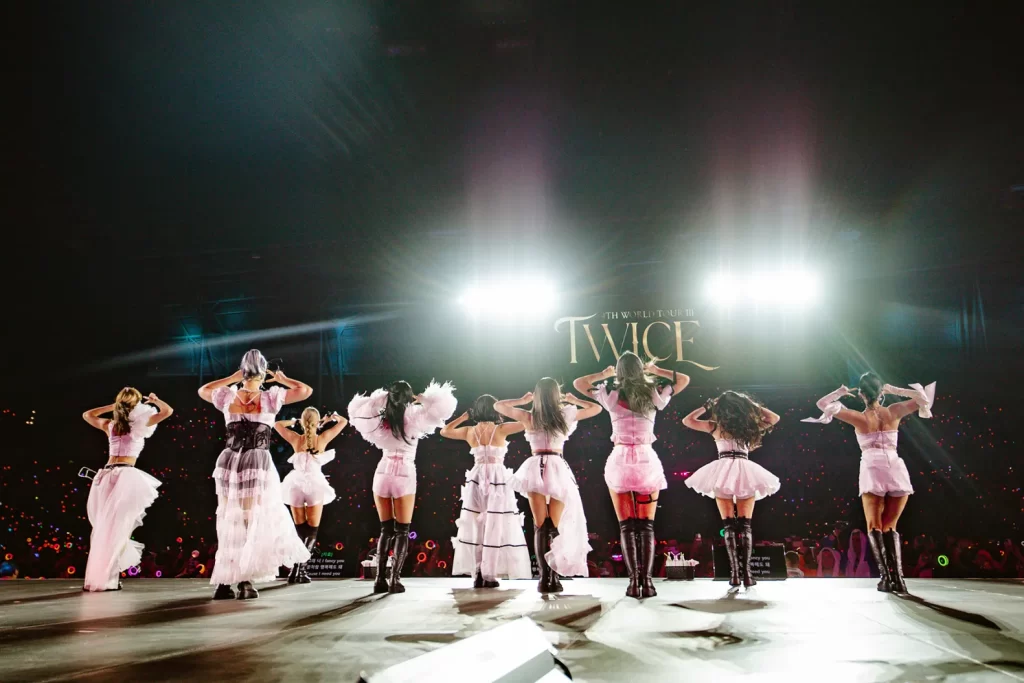Across the world, populations have been engulfed by the wave of K-culture as it rapidly sets into cities and grows in popularity. One aspect of Korean pop culture that has increasingly become welcomed by international audiences is K-pop.
But what is it? K-pop, also known as Korean pop music, is a musical genre that covers a wide range of artists who have become trendsetters, influencers, and fashion icons in international media. Born in South Korea, the origin of K-pop goes back to the 20th century. For decades, many artists debuted without much of a global impact, as their reach was mainly limited to Korean and Asian audiences. Then, in the 1990s, the first band that resembled the K-pop artist of today was formed. Seo Taiji in the Boys mixed genres and combined dance, rap, and vocals in a way no one had done before. The first few generations of K-pop artists paved the way in the 1970s and made the genre a part of South Korean culture and known nationally. However, it wasn’t until later in the 2010s that K-pop made its global mark on the rest of the world.
When Singer PSY released “Gangnam Style” in 2012, it quickly gained a billion views in less than six months after its release, shocking audiences everywhere. A part of YouTube’s Billion Views Club, “Gangnam Style” became the first K-act to join the club. PSY opened the door for more K-pop artists to take the stage. In the following years, some of the most famous K-pop groups debuted. BTS, BLACKPINK, TWICE, and EXO contributed heavily to the global expansion of the genre as their companies promoted them internationally.
The rise of social media is arguably one of the foremost factors that allowed K-pop to become mainstream in many Asian countries. Dance challenges encourage fans to trend songs and share their favorite artists’ music through social media platforms used by billions. Other digital platforms, such as YouTube, allow music videos to be accessible to many users. Furthermore, some trends can be seen in K-pop, where the music reflects current events. This grabs the attention of those following social movements and continues to harness more fans with every release.
As mentioned, K-pop artists have slowly infiltrated the fashion world, with many representing luxury designer brands as global ambassadors and models. K-pop idols are often praised for how they break gender stereotypes and make loud, distinct fashion statements that set them apart from other celebrities. Thus, these artists have become the faces of many brands as their reach spills over into fashion and clothing.
Every K-pop artist strives to be different and create a unique image in the industry. From deep, intricate backstories to complex storylines for albums to having multiple variety shows, the connections these artists make with their fans on a deeper level set K-pop apart from other musicians. The global power that groups like BTS and BLACKPINK hold all boils down to their dedication to their loyal followers. In other words, K-pop is more than a constantly evolving genre but a community of talented artists fostered by millions of enthusiastic individuals.
These past few years have contributed dramatically to the growth in K-pop’s popularity. As a result of digital marketing, many groups have gone from barely a million views on a music video to selling out dozens of stadium concerts within just a few years. While K-pop has yet to become mainstream in many Western countries, K-pop artists have continued to perform abroad, headlining popular music festivals such as Coachella and Lollapalooza, to name a few. Most recently, the million album-selling girl group TWICE became the first-ever K-act to receive an award at the Billboard Women in Music 2023 with the Breakthrough award. While K-pop continues to break records and become globally represented, fans are the biggest reason for K-pop’s continuous growth.
Works Cited
Arnaud, Jourdan. “A Brief History of K-Pop.” The Los Angeles Film School, 20 Feb. 2023, https://www.lafilm.edu/blog/a-brief-history-of-kpop/#:~:text=K%2Dpop%20or%20Korean%20Pop,R%26B%2C%20electronic%2C%20and%20dance.
Kim, Suk-young. “Op-Ed: Hollywood, Take Note: Korean Pop Culture Is Here to Stay.” Los Angeles Times, Los Angeles Times, 9 Apr. 2022, https://www.latimes.com/opinion/story/2022-04-09/korean-pop-culture-music-dramas-movies-bts.
Nittle, Nadra. “K-Pop’s Popularity Is Starting to Shape Fashion Worldwide.” Vox, Vox, 4 Dec. 2018, https://www.vox.com/the-goods/2018/12/4/18124626/k-pop-bts-fashion-melon-music-awards-jin-birthday.
Seoulspace. “The History of K-Pop – How It Became a Global Phenomenon .” SEOULSPACE, 11 Jan. 2023, https://seoulspace.com/the-history-of-k-pop-how-it-became-a-global-phenomenon/.
Wang, Amy X. “How K-Pop Conquered the West.” Rolling Stone, Rolling Stone, 13 Nov. 2018, https://www.rollingstone.com/music/music-features/bts-kpop-albums-bands-global-takeover-707139/.
